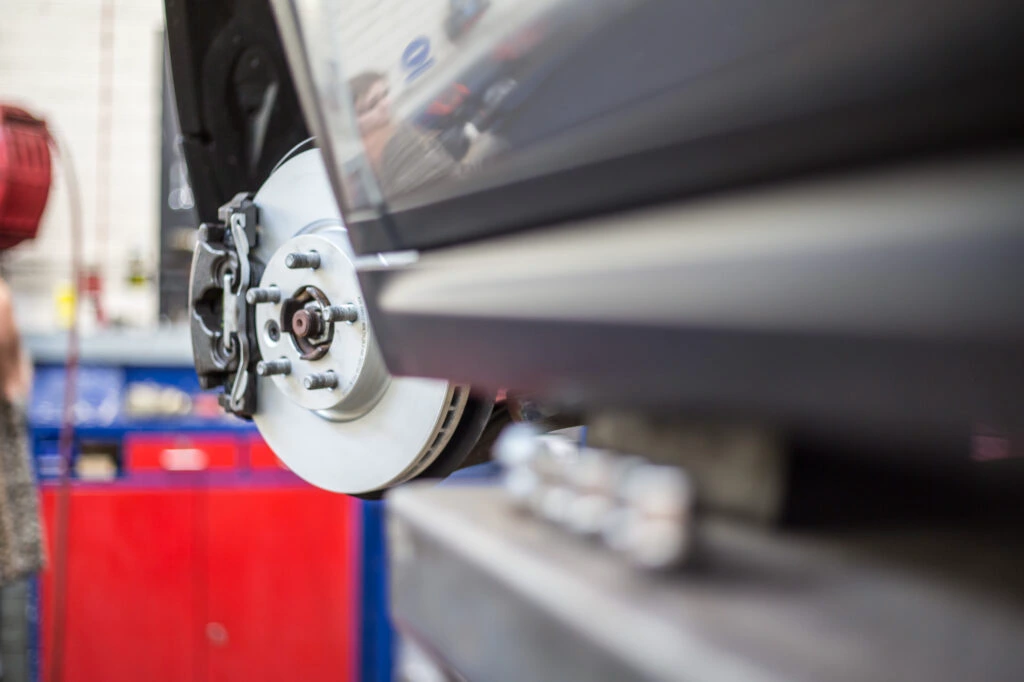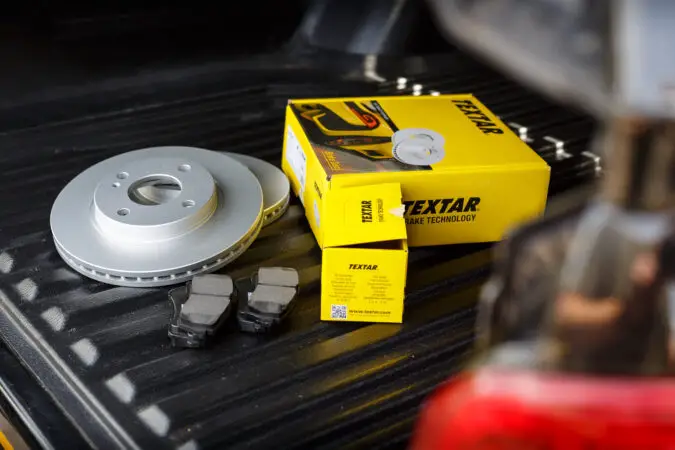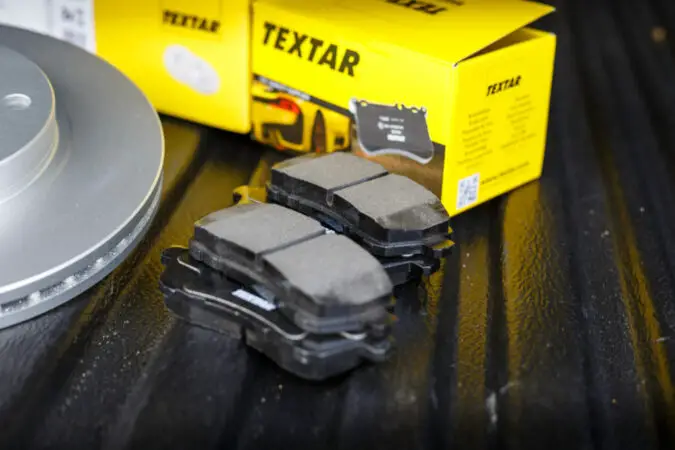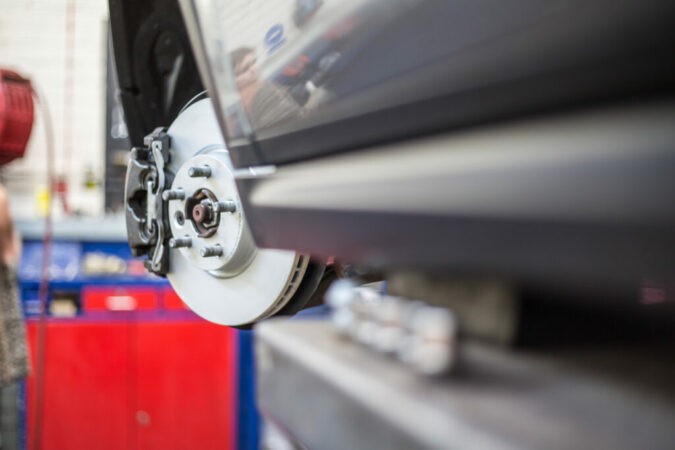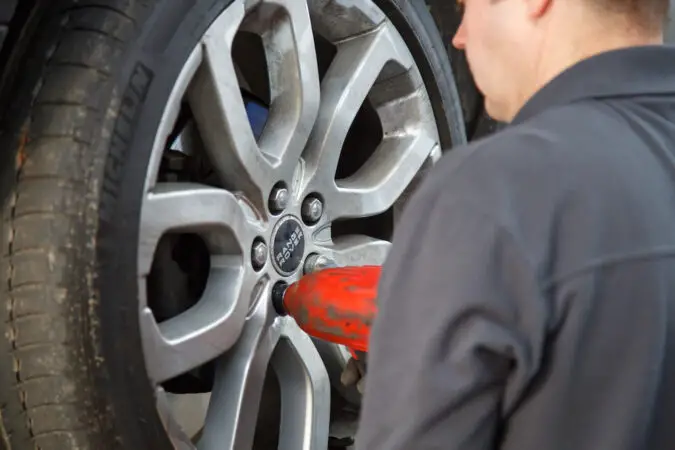Brake pads are wear and tear parts that any car owner has to replace periodically. How long do brake pads last is a question that looms into our minds the moment we mention periodic replacement. We will try to answer these questions and much more in this story.
Just like all the fluids, belts, and bearings, replacing the pads is a strict maintenance step that the owner should never skip. So, it is necessary that everyone should have a clear answer to the question, “how long do brake pads last?”.
This depends on multiple factors. We will detail each of those, as well as the replacement cost of brake pads, and the procedure for the same. But before that, let us take a quick look at what brake pads are and how they work.
What Are Brake Pads?
Brake pads are quite a familiar commodity for all except for those who are uninitiated to the automotive world. Most of us may be familiar with it but we still can have questions about this simple yet important part of our vehicle. Of course, learning anything related to the brakes of a car is worthy of our time.
So, the questions may include, how do they work? What types are there? How long do brake pads last? Fret not, we will look into each of these in detail.
How Do Brake Pads Work?
Brake pads may look quite simple in construction, and they are. But their function in the system of a car is extremely important. They are the sole component that grabs down on the wheel of your speeding car to help you stop it. Any fault in them will end up in quite a lot of damage, irrespective of how good the rest of your braking system is.
In the brake system of a car, there are a number of parts that are connected in series. This starts from the brake pedal and extends all the way to the brake rotors. The chain reaction starts from the driver’s leg when she/he presses on the brake pedal. The pressure is amplified by a brake booster which then transfers its pressure to a master cylinder. The master cylinder decides the amount of braking pressure for each wheel with the help of a ton of electronics.
After these decisions are made, it then pumps enough brake fluid to each of the four wheels (fun fact, go check out our guide on how many wheels are in the world). At the wheels, the brake fluid rushes into the brake calipers in which the brake pads sit. They’re then pushed onto a brake rotor which is directly connected to the wheel.
As the frictional forces acting on the brake rotor grinds it to a stop, the wheel is also brought to a stop along with it. The brake pads, as we have seen, play quite an important role here. All the complex electronics, expensive machinery, and elaborate software will all be useless if they underperform. Now, you know why it is vital to find an answer to the question “How long do brake pads last?” But depending on many factors, this question may have different answers.
What Are The Types Of Brake Pads?
Just like the question “how long do brake pads last?”, this question too has multiple answers. This is in tune with many other car parts as buyers now get multiple options for everything. The customers can choose between them based on the cost, type, and a long list of other traits.
Based on the material used to make brake pads, they can be classified as organic, semi-metallic, and ceramic pads. Each of these types has its own pros and cons. Similarly, they all find certain applications to be perfect for their usage. When we try to find how long do brake pads last, it is essential to know the various types, as they have a direct impact on the longevity of these pads.
1. Organic Brake Pads
As their name suggests, they’re made of organic materials. Carbon, rubber, glass, Kevlar, the lot. These materials are bonded into them using a resin. There may be some additives in these compounds to increase friction.
The organic pads form the entry step to the world of brake pads. The materials used in its construction are cheaper, hence making it the perfect choice for economy cars. But keeping the cost aside, there are other areas of performance that other types do better.
Organic pads wear away faster than ceramic pads. But that does not mean that you will have to change them every month. In fact, they may last you an awful lot of time depending on your driving pattern and driving style.
2. Semi-Metallic Brake Pads
These are usually chosen by drivers who have extreme requirements for their brakes. Especially if they hit the track quite often, or tow heavy loads, semi-metallic ones can improve the braking performance significantly.
The compound may use more than 30% metal in its construction. Due to this, the metal compound is harder than other types. This puts additional stress on the rotors. Semi-metallic pads usually wear out quicker because of the demanding situations they usually have to perform in. Hence, it is good for your use if your use contains regular track runs, or towing.
In even more extreme cases, even full metal brake pads are used. These will only make the answer for “how long do brake pads last?” shorter. The stress on these pads is sky-high in these situations. If these were organic pads, they would wear out in a jiffy.
3. Ceramic Brake Pads
Compared to semi-metallic and organic pads, ceramic ones provide the longest life. The longevity is higher due to the lower compressibility of the material compared to the organic pads. The compressible organic pads can wear out quickly, especially if used in demanding situations. The ceramic pads perform exponentially better in these areas.
Even if you drive a city car, using ceramic can have additional advantages over organic. But with the limited speeds and stop-and-go traffic, they may not be as clear to you as you want them to be. But on a highway or a winding back road, the advantages of ceramic pads shine through.
The only disadvantage with the ceramic ones is the cost. It is more expensive compared to the organic kit. But if you want the best answer to how long do brake pads last, there is no better option than ceramic ones.
Types of brake pads are not the only factor that affects how long do brake pads last. A multitude of other factors contributes to their longevity. It includes the environment the vehicle is driven in, the driving habits of the driver, maintenance schedules, and more. Let us see how each of these factors affects how long do brake pads last.
How Long Do Brake Pads Last?
It may sound counterproductive, but the only straightforward answer to this question is eh, it may be 100 miles or it can be 100,000 miles. Does sound ambiguous does it not? But it is not as obscure as it sounds, as we can give proper reasoning for the same.
As we know, many factors work together to determine their longevity. Based on these, you may chomp through them in 100 miles or 100,000 miles. It is that dynamic. To understand how Without wasting much time introducing them again, let us jump straight into this list and see how each of them affects how long do brake pads last.
1. Operating Environment
All vehicles have different areas of operation. Some of them are destined to live their entire life crawling through bumper-to-bumper traffic. Some are destined to be highway mile munchers while others may be made to do both. Track days may be a common fare for some while some others may be hauling heavy cargo. This environment and application have a direct effect on how long do brake pads last.
Let us look at how different environments affect their longevity
a. Highways
If you use your vehicle primarily for highway runs, you may be lucky in this aspect. The brake pads of these vehicles will last longer than a city-driven car’s pads. Lack of constant braking is the obvious reason here. Usually, brakes are less frequently used on a highway compared to in a city.
b. City
Using a car on a regular commute through thick city traffic can easily eat up your brake pads. Though the pressure on the pads is not that much due to the low speeds, it still wears out quicker compared to a highway-driven vehicle.
The constant on and off braking can have a detrimental effect on them. This will certainly affect how long do brake pads last.
c. Mountain Roads
Here is a situation that eats them up like it is breakfast. Mountain roads demand a lot of braking, especially when going downhill. Stick shift users will be slightly happier here as they can use the gears to slow down the vehicle. But automatic drivers need more assistance from their brakes to slow down their cars.
Electronic assistance systems are now available to make it easier for the driver in these situations. But these too, need a lot of braking, and hence, more brake wear.
d. Tracks
These are two different recreational uses of motor vehicles. These require different types of driving styles. On a race track, brakes are very important as it prepares the driver to take a corner at a quick but safe speed. On a track, brakes can wear out like crazy as late, hard braking is what all drivers aim for. This is where ceramic solution shines, due to their comparatively lower wear.
e. Off-Road Trails
On an off-road track though, the usage of brakes is minimal. The trucks and SUVs that are made to tackle these terrains are mostly equipped with low-range gearboxes. The low-range transfer cases take care of the torque delivery, allowing the vehicle to climb or descend at a constant speed. This minimizes the use of brakes and reduces brake pad wear.
But if your vehicle is not fitted with the toughest of off-road tech, you may have to rely heavily on your brakes. This can bring down their usable lifespan. So, it depends on your vehicle and the hardware it holds. But most serious off-road enthusiasts use tough off-road trucks with all the required gizmos so the brakes are at a better place.
2. Driving Style
If you are planning to compute how long do brake pads last, the calculations should start with you. Your driving style to be precise. The driving style has a profound effect on how long do brake pads last. Proper driving habits can prolong their life by a huge margin.
In this section, we will have a look at the driving habits that can have a heavy toll on them. We will also discuss the good habits that you can follow to prolong their life.
Wrong Driving Habits
- Sudden acceleration and braking: We are not talking about emergency braking you do to avoid a collision. No, not at all. Many drivers have the habit of accelerating suddenly and braking hard right before they want to stop. This unnecessary stress on them can obviously take a lot of life away from them. If you drive like this and wonder how long do brake pads last, it may not be the right use of time.
- Resting foot on the brake: This is yet another common habit found in the driving community. It affects motorcycle riders more as they find it easier to rest their foot lightly on the brake pedal. But it does not mean that it is uncommon among car drivers. If your foot presses the brake pedal, even in a light way, it can actuate the brakes. The brake booster will amplify whatever pressure you are putting. Hence, the pads will keep on brushing against the rotor, reducing their life,
- Poor maintenance: This is not a driving habit. But even ignoring the maintenance of your car can end up reducing the life of your brake pads. Keeping the car idle for a long time, wrongly bled brake lines, and faulty calipers can kill the pads.
Driving Habits To Increase How Long Do Brake Pads Last
- Engine Braking: If you want to extend how long do brake pads last, this is your best friend. Engine braking lets the gears and engine do the braking for you instead of relying completely on them. But to use engine braking effectively, you will have to drive with more caution. If there is a stop that you can anticipate, like a traffic light, let off the throttle some time ago, and let the vehicle coast. In this situation, you will have to use the brakes only for a moment, just for the final stop.
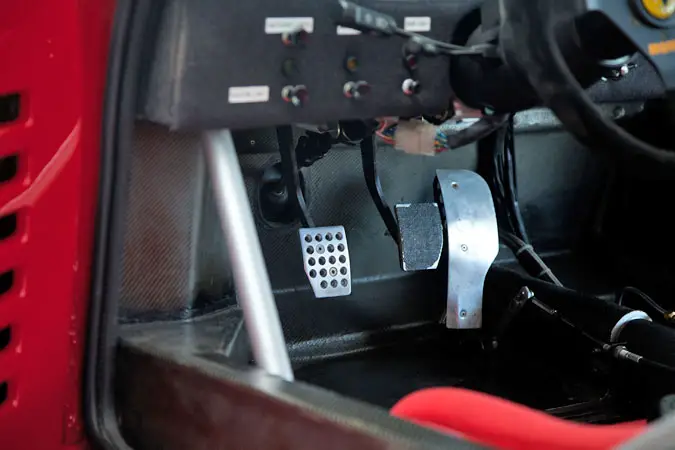
- Removing unnecessary weight: It is simple physics that it takes more effort to stop something that is heavy. Similarly, if your car is heavy, your brake pads have to work a lot extra to bring it down to a halt. Lugging around unnecessary weight can not only slow you down when you accelerate but also eat them up.
3. Type Of Brake Pads
We have discussed this in length in a previous section of this story. Their lifespan of organic, semi-metallic, metallic, or ceramic varies greatly based on their type. So if you are trying to figure out how long do brake pads last, it is imperative that you consider this factor as well.
Cost Of Replacing Brake Pads
As they’re common wear and tear replacement part, the cost of replacing them is not that too much. This should stop us a bit from worrying about how long do brake pads last. But it does not mean that you should completely ignore this expense. Any penny spent on your vehicle should be carefully calculated to not end up paying for the wrong product.
So, let us have a look at how much it will cost you to change them. Just like every car part out there, the cost of brake pads does not stay the same for all vehicles. You cannot expect a premium car’s pads to cost the same as that of an econobox. But if you are seeking an answer to the question “how long do brake pads last?”, it may be the same for all kinds of vehicles, depending on the type of brake pads.
Of course, it will differ based on the environment the vehicle is used. But any vehicle used by the same driver in the same situation with the same kind will give you similar brake pad life. But the replacement cost will always depend on the make of your vehicle as well as its premium positioning.
In general, if you have a normal vehicle, you can expect to pay $30 to $50 for a pair of pads. But the total price bumps up when you consider the labor costs. Including labor, it can cost you beyond $100 or $150 per axle. In some cases, your rotor may need resurfacing if they’ve dug too much into it. This will only increase the costs even further.
How To Replace Brake Pads?
If your worry about how long do brake pads last have now given way to the worry about the cost of the pads, DIY-ing it may look like a viable option. Of course, it is not an easy process for the uninitiated, and attempt to do it only if you are an experienced person. After all, your vehicle’s brakes are not really the best area you can learn car repair on.
Let us look at the procedure of changing them step-by-step. Once you master this, your worry about how long do brake pads last can rest for a while as it takes away a huge part of the total amount needed for brake pad replacement.
Brake Pad Replacement Process
- Removing the wheels: This is not a step that needs a lot of explanation, that is for sure. Jack up your car, ensure that it is safely positioned on the jack stand, and remove the wheel from where the brake pads of which you are planning to change.
- Ensuring access: If it is a front wheel, turning the steering to its side can liberate more room for you to work. For rear wheels, there is nothing you can do apart from using the right tools in tight areas.
- Removing the calipers: If you are planning to only change the brake pads, there is no need to completely remove the calipers from the rotor. Instead, you can loosen the two bolts that are holding the caliper to the rotor. This will help you open up the caliper without completely removing it. When you are removing it, ensure that the brake line is not pulled on. So, depending upon your vehicle, open it either to the top or the bottom.
- Removing old brake pads: Simply pull out the old brake pads and the old pins that held them in. Also, you can use a wire brush to remove any brake dust.
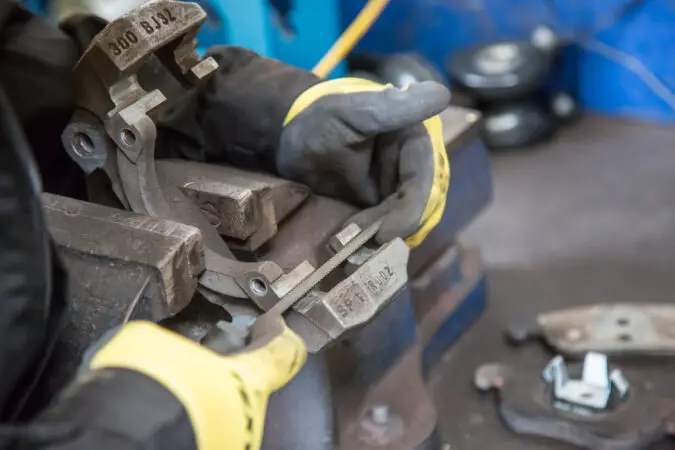
- Compress the piston: As the old and new brake pads differ in their width, you will have to adjust the piston to accommodate the new pads. You can compress the piston using your old brake pads and a brake compressor tool. This pushes in the compressor, making room for the new pads
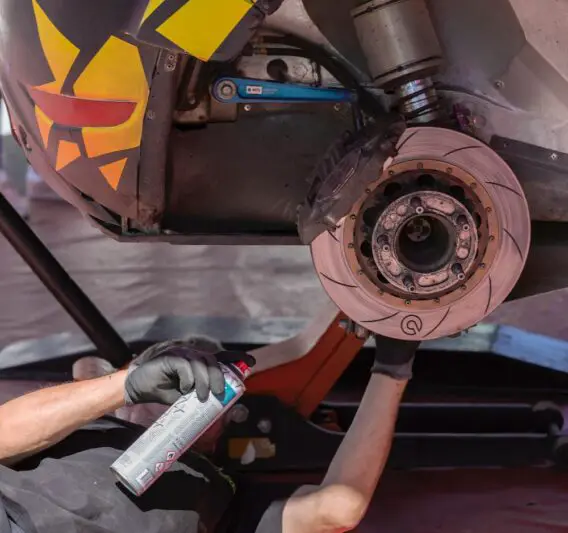
- Insert the new pads and pins: Now, insert the new pads and pins, and lock them in place.
- Close the caliper: Now, the caliper can be closed and the bolts can be tightened. Fit back the wheels and voila! You are done!
Brake Pad Lifespan: What You Need to Know
- Brake pads are a crucial part of a vehicle’s braking system and are located between the brake shoe and the brake drum.
- The friction caused by the braking pad and the brake rotor slows down the vehicle and causes the brake pads to wear away over time.
- There is no standard answer to how long brake pads last, but car manufacturers estimate they can last anywhere from 20,000 to 70,000 miles.
- The longevity of brake pads depends on driving habits, the type of brake pads, the type of transmission, driving environment, and the condition of the brake rotors and calipers.
- Signs that brake pads need replacing include squealing brake pads, metallic grinding, thin brake pads, and indicator lights.
- To extend the lifespan of brake pads, consider driving slower, reducing the weight of the car, and utilizing engine braking when appropriate.
- Organic brake pads have the lowest lifespan, while semi-metallic brake pads and carbon ceramic brakes have a longer lifespan of about 50,000 and 70,000 miles, respectively.
- Engine braking allows drivers to slow down by downshifting gears instead of activating their brake pads and wearing them down, but it’s not recommended for automatic transmission systems.
- A stuck brake caliper or a warped rotor can cause brake pads to wear out sooner than usual, so it’s essential to check the condition of brake rotors and calipers regularly.
- Regular inspection and maintenance can help keep brake pads in perfect condition and prevent costly repairs.

